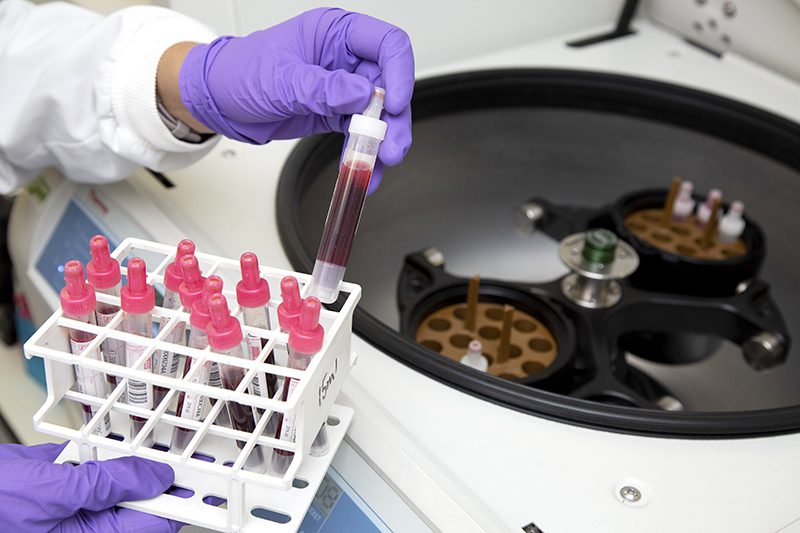‘Supporting others to be as effective in their roles as they can be’

It’s not too great a leap from medieval history to clinical research – as Quality Assurance Manager (and history graduate) Anna Chapman explains below!
What do you do day-to-day?
My role focusses on the processes we use in the Cambridge Clinical Research Centre. On the one hand, I help to make sure that we ‘say what we do’ – that we document all of our processes appropriately. On the other hand, I work on making sure that we ‘do what we say’ – that our working practices follow the documented processes.
How do you work with / support researchers?
Most of my work is fairly behind the scenes as a far as researchers are concerned, but my goal is to support our research nurses to make sure we deliver quality research in a consistent fashion.
What is rewarding about your job?
Because the biomedical campus leads on so much of cutting-edge science, we’re always having to think about new ways of delivering new types of research. The satisfaction that comes from doing a challenging job well is really rewarding.
What challenges / difficulties do you face in your role?
Most researchers and research support staff face quite a few competing pressures: research needs to be delivered safely, quickly and to a very high standard. Clinical research is also a really highly regulated field, so we also have to make sure that keep really good records of how we work, all of which all takes time and effort. We have to get the balance right between doing things quickly and doing them well, and occasionally people disagree on where the line between the two lies.
Why is your role important?
I see my job as all about supporting other people to be as effective in their roles as they can be. My experience on working on the Biomedical Campus is that we have a huge number of staff who are thoughtful and imaginative problem-solvers, up to tackling any challenge that comes their way. The most enjoyable parts of my role are when I get to bounce ideas off my clinical colleagues and come up with new, improved ways of working.
What work have you been doing during the Covid-19 pandemic?
Covid-19 has changed the way we work quite a lot: the CCRC has delivered research into Covid-19 itself, which meant that I was involved in creating new processes to help us tackle that. We’ve also done a lot of thinking about how we responded to Covid-19 and what we can learn from it, so I’ve been working on making sure we don’t lose any of the really valuable knowledge we’ve gained from an awful situation.
What are the opportunities open to people working in an administration role in research?
There are always lots of training opportunities available to anyone thinking of going into research administration: lots of agencies are keen to offer their expertise. More excitingly (at least for me), administrative roles in research give you the opportunity to use skills you might have picked up in a completely different field. I studied medieval history at university and use the analytical, investigative skills I picked up there on a daily basis in my current role.
Why did you want to work in a research setting?
Working in clinical research provides a nice balance for me: I feel like every shift I put in makes a real difference, but it’s a fast-moving field so none of us get to rest on our laurels for very long before we’re dealing with the next challenge.
What did you know about research before working in a research environment?
I’d previously worked in public health, providing literature reviews for commissioners. I saw a lot of published research, so knew a little bit about how much work goes on, but had no idea how complex and exciting a world it is.
But I’ve also learned massively ‘on the job’ – prior to my current post I spent nearly 10 years working for the NIHR Clinical Research Network in Cambridge, on research management and governance.
What have you learnt since working in research?
It’s really eye-opening – you realise how much thought goes into even the simplest or most straightforward-seeming decisions.
What skills do you need to work in an administrative research role?
You need to be creative and a good problem-solver. You also need to be able to see both the bigger picture and the consequences of smaller details and decisions within it. You definitely need patience, as well: lots of it!
What is the great thing about working in research?
It’s really humbling to be part of supporting research that will help patients in future.
What advice would you give to someone who wants to work in an admin position in research?
The landscape of research can sound quite dry: I’ve mentioned regulatory requirements, documenting processes and thinking about the impact of small details here. But it’s the skills you get to use that make it exciting. It’s the combination of imagination, problem-solving and critical thinking that makes research administration so much more interesting than it sounds.
Why do you think research is important?
Research is the absolute cornerstone of evidence-based practice. High quality research changes healthcare delivery and is the route to better outcomes for patients.


